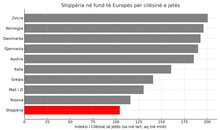
 Flash News
Flash News
Gunfire in Durres, a 30-year-old man is injured
Accident on Arbri Street, car goes off the road, two injured
Arrests of "Bankers Petrolium", Prosecution provides details: Exported and sold 532 billion lek of oil, caused millions of euros in damage to the state
Ndahet nga jeta tragjikisht në moshën 28-vjeçare ylli i Liverpool, Diogo Jota
Posta e mëngjesit/ Me 2 rreshta: Çfarë pati rëndësi dje në Shqipëri

Questions have been raised about whether Canada could hypothetically apply to join the European Union amid its "strained" relations with the US, but experts say its geographical and cultural distance from the continent poses a problem.
Social media is abuzz with Europeans and Canadians calling for Canada to join the European Union. The posts are full of comments from users suggesting that Canada could and should join the EU to break away from its ties to Washington, as the Trump administration threatens to make Canada its 51st state and impose tariffs on its traditional allies there and in Europe.
It is reported that supporters of Canada becoming the bloc's 28th member state cite its European-style public health care system, its unique English- and French-speaking culture, and its participation in NATO as some of the reasons for joining.
However, more posts of this kind come after new Prime Minister Mark Carney alluded to Canada's European roots during a visit to the old continent, his first official foreign trip since taking office, where he met with French President Emmanuel Macron and UK Prime Minister Keir Starmer to discuss Trump.
"I want to ensure that France, and all of Europe, work enthusiastically with Canada, the most European of non-Europeans," Carney said, adding that he wanted to maintain the most positive relationship possible with the US.
The meeting comes after a poll released by Abacus Data in late February found that 44% of Canadians believe their country should join the EU, compared to 34% who say it should not. Another 46% of respondents support Canada's membership, compared to 29% who would oppose it. But is this actually possible? Could Canada really join the bloc?
What does EU law say?
Paula Pinho, spokeswoman for European Commission President Ursula von der Leyen, said at a conference in early March that they were "honored" by the survey results because they showed the attractiveness of the EU, but added that Article 49 of the Treaty on European Union states that only European states can apply for EU membership.
This is actually what the treaty says: “ Any European State which respects the values referred to in Article 2 and is committed to promoting them may apply to become a member of the Union”.
Megjithatë, traktati nuk përcakton saktësisht se çfarë përbën një shtet evropian. Një dokument i vitit 1992 nga komisioni i Komuniteteve të atëhershme Evropiane na jep një të dhënë, megjithatë, duke theksuar rëndësinë e lidhjeve gjeografike dhe kulturore.
“Termi “evropian” nuk është përcaktuar zyrtarisht. Ai kombinon elemente gjeografike, historike dhe kulturore të cilat të gjitha kontribuojnë në identitetin evropian. Përvoja e përbashkët e afërsisë, ideve, vlerave dhe ndërveprimit historik nuk mund të kondensohet në një formulë të thjeshtë dhe është subjekt i rishikimit të çdo brezi pasardhës”, thuhet në të.
“Organizatat e tjera kontinentale mund të shërbejnë gjithashtu si barometër për evropianitetin”, sipas Peter Van Elsuwege, profesor i së drejtës së BE-së në Universitetin e Gentit.
"Një pikë tjetër referimi është anëtarësimi në Këshillin e Evropës, pasi kjo organizatë është gjithashtu e hapur vetëm për shtetet evropiane. Prandaj, anëtarësimi në Këshillin e Evropës jep një tregues të kufijve të Evropës”, vazhdoi profesori.
Raportohet se Statuti i Këshillit të Evropës, i cili i paraprin BE-së, thotë: “Çdo shtet evropian…mund të ftohet të bëhet anëtar i Këshillit të Evropës nga Komiteti i Ministrave”.
A ka aplikuar më parë ndonjë vend joevropian për t’u anëtarësuar në BE?
Vendet nga jashtë Evropës kontinentale kanë kërkuar më parë dhe madje përfundimisht u bashkuan me BE-në. Qiproja, e cila është kulturalisht dhe politikisht evropiane, por gjeografikisht e vendosur në Azinë Perëndimore, u bë anëtare e plotë e BE-së në vitin 2004. Ndërsa një pjesë e Turqisë ndodhet në Evropë, pjesa më e madhe është gjithashtu në Azinë Perëndimore.
Megjithatë, është një vend zyrtar kandidat për në BE, pavarësisht se bisedimet e pranimit kanë ngecur për vite me radhë. Maroku, megjithatë, aplikoi për t’u bashkuar në 1987, por u refuzua sepse nuk ishte një vend evropian. Ndryshe nga Qiproja dhe Turqia, Maroku nuk është anëtar i Këshillit të Evropës, dhe as Kanadaja, e cila është një nga pengesat më të mëdha për anëtarësimin e saj në BE, sipas Van Elsuwege.
“Kanada ashtu si Maroku në të kaluarën nuk e plotëson kriterin e një shteti evropian. Në veçanti, Kanada gjeografikisht nuk ndodhet në Evropë, nuk është një vend anëtar i Këshillit të Evropës dhe nuk ka ndonjë lidhje të lashtë me zhvillimin kulturor të Evropës”, shtoi Van Elsuwege.
Profesori ndër tjera vuri në dukje se kjo është thelbësisht e ndryshme për Qipron dhe Turqinë. Në rastin e parë, Komisioni Evropian vendosi që roli i Qipros në zhvillimin e kulturës dhe qytetërimit evropian, përveç lidhjeve të ngushta kulturore, politike dhe ekonomike me pjesën tjetër të kontinentit, e bëri aplikimin e saj të pranueshëm. Për Turqinë, gjeografia dhe historia e saj luajnë një rol që ajo të konsiderohet një shtet evropian.
" This was already the case in the 1963 association agreement between the European Economic Community and Turkey, which includes a reference to a possible future membership application by Turkey," Van Elsuwege said.
"Cyprus and Turkey are quite specific cases, which cannot be seen as precedents to conclude that Canada can potentially be considered a European state under Article 49 TEU ," he concluded.
Therefore, the most likely conclusion is that Canada cannot legally join the EU because it is not culturally, politically or geographically European and a hypothetical Canadian application would require a legal review of the treaties./ EURONEWS
Latest news










Greece imposes fee to visit Santorini, how many euros tourists must pay
2025-07-03 20:50:37
Don't make fun of the highlanders, Elisa!
2025-07-03 20:43:43
Gunfire in Durres, a 30-year-old man is injured
2025-07-03 20:30:52

The recount in Fier cast doubt on the integrity of the vote
2025-07-03 20:09:03




Heatwave has left at least 9 dead this week in Europe
2025-07-03 19:00:01

Oil exploitation, Bankers accused of 20-year fraud scheme
2025-07-03 18:33:52
Three drinks that make you sweat less in the summer
2025-07-03 18:19:35
What we know so far about the deaths of Diogo Jota and his brother André Silva
2025-07-03 18:01:56



Another heat wave is expected to grip Europe
2025-07-03 17:10:58

Accident on Arbri Street, car goes off the road, two injured
2025-07-03 16:45:27

Accused of two murders, England says "NO" to Ilirjan Zeqaj's extradition
2025-07-03 16:25:05





Gaza rescue teams: Israeli forces killed 25 people, 12 in shelters
2025-07-03 15:08:43
Diddy's trial ends, producer denied bail
2025-07-03 15:02:41

Agricultural production costs are rising rapidly, 4.8% in 2024
2025-07-03 14:55:13
Warning signs of poor blood circulation
2025-07-03 14:49:47
Croatia recommends its citizens not to travel to Serbia
2025-07-03 14:31:19
Berisha: Albania is the blackest stain in Europe for the export of emigrants
2025-07-03 14:20:19


'Ministry of Smoke': Activists Blame Government for Wasteland Fires
2025-07-03 13:59:09

AFF message of condolences for the tragic loss of Diogo Jota and his brother
2025-07-03 13:41:36
Five healthy foods you should add to your diet
2025-07-03 13:30:19






A unique summer season, full of rhythm and rewards for Credins bank customers!
2025-07-03 12:12:20

Fire situation in the country, 29 fires reported in 24 hours
2025-07-03 12:00:04
The constitution of the Kosovo Assembly fails for the 41st time
2025-07-03 11:59:57
The gendering of politics
2025-07-03 11:48:36

The price we pay after the "elections"
2025-07-03 11:25:39

Xhafa: The fire at the Elbasan landfill was deliberately lit to destroy evidence
2025-07-03 11:08:43

The 3 zodiac signs that will have financial growth during July
2025-07-03 10:48:01
Democratic MP talks about the incinerator, Spiropali turns off her microphone
2025-07-03 10:39:24

Ndahet nga jeta tragjikisht në moshën 28-vjeçare ylli i Liverpool, Diogo Jota
2025-07-03 10:21:03
Cocaine trafficking network in Greece, including Albanians, uncovered
2025-07-03 10:10:12



Korreshi: Election manipulation began long before the voting date
2025-07-03 09:39:13
Arrest of Greek customs officer 'paralyzes' vehicle traffic at Qafë Botë
2025-07-03 09:28:41
After Tirana and Fier, the boxes are opened in Durrës today
2025-07-03 09:21:10
Enea Mihaj transfers to the USA, will play as an opponent of Messi and Uzun
2025-07-03 09:10:04

Foreign exchange, the rate at which foreign currencies are sold and bought
2025-07-03 08:53:50
Index, Albania has the worst quality of life in Europe
2025-07-03 08:48:10


Horoscope, what do the stars have in store for you today?
2025-07-03 08:17:05
Clear weather and high temperatures, here's the forecast for this Thursday
2025-07-03 08:00:37
Posta e mëngjesit/ Me 2 rreshta: Çfarë pati rëndësi dje në Shqipëri
2025-07-03 07:46:48



Lufta në Gaza/ Pse Netanyahu do vetëm një armëpushim 60-ditor, jo të përhershëm?
2025-07-02 21:56:08
US suspends some military aid to Ukraine
2025-07-02 21:40:55



Methadone shortage, users return to heroin: We steal to buy it
2025-07-02 20:57:35
Government enters oil market, Rama: New price for consumers
2025-07-02 20:43:30
WHO calls for 50% price hike for tobacco, alcohol and sugary drinks
2025-07-02 20:41:53



